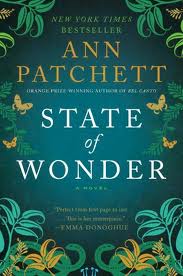 Dr. Marina Singh receives word that her colleague and friend, Anders Eckman, has died while on assignment in the Amazon. Anders was charged with bringing back information on the progress of fertility drug research headed up by the great Dr. Annick Swenson for the head of Vogel drug company, Mr. Fox. In the wake of Dr. Eckman’s death, and failure to discover Swenson’s progress with the elusive drug, Mr. Fox sends Marina, Dr. Swenson’s former student, deep into the Amazonian jungle to uncover the whereabouts of Anders’ remains and the information that eluded her predecessor.
Dr. Marina Singh receives word that her colleague and friend, Anders Eckman, has died while on assignment in the Amazon. Anders was charged with bringing back information on the progress of fertility drug research headed up by the great Dr. Annick Swenson for the head of Vogel drug company, Mr. Fox. In the wake of Dr. Eckman’s death, and failure to discover Swenson’s progress with the elusive drug, Mr. Fox sends Marina, Dr. Swenson’s former student, deep into the Amazonian jungle to uncover the whereabouts of Anders’ remains and the information that eluded her predecessor.
State of Wonder begins with the tone of a quasi-thriller or mystery. Lies and secrets abound. There’s an unexpected and largely unexplained death, a trip into the dangerous unknown, and a mysterious drug that could grant lifelong fertility to women. It starts strong but then there’s a lull. On arrival in the Amazon, Marina makes the acquaintance of the Bovenders, a young couple that housesit for Dr. Swenson and protect her from the intrusions of the outside world. I found the relationship between the Bovenders and Dr. Swenson a strange addition. They’re so protective of her, so enamoured with her drive to succeed, and her unwavering belief that she is always right and never accountable to anyone. Fearless is a positive way of describing Swenson, but these aren’t qualities I usually find the slightest bit admirable. As I read I thought, perhaps she’s supposed to be the villain of the piece, to put things in absolute terms. Between the Bovenders’ obsequious pandering and Marina’s tragic reminiscences of her time as her student, I initially felt like hitting Dr. Swenson. However, despite being portrayed as merciless, icily composed and lacking empathy she does turn out to be a fascinating character.
State of Wonder improves greatly, at least for a time, after Dr. Swenson appears in the flesh, about half way through the novel. Not only do Marina and Swenson begin travelling deep into the jungle but Swenson’s presence brings a sparkle that was sorely lacking. Marina is a poor choice for a main character. Essentially, she’s bland. Prior to Dr. Swenson’s appearance all there was to keep me entertained was the turgid, lukewarm romance between Mr. Fox and Marina, and Marina’s trite recurring nightmare of losing her father in a crowd in India.
Once Dr. Swenson makes her appearance I realised that she was what the story was missing. Swenson makes an engaging antagonist. Her stories and perspective are unique. She’s continually frustrating because she has an answer for everything and is driven by pure logic, but is still so often annoyingly right. Annick Swenson makes you think twice, as opposed to Marina, summed up here by Swenson herself, ‘I keep hoping that you are more than you show yourself to be, Dr. Singh. I am just on the verge of liking you but you dwell on the most mundane points.’ Even Anders, from rare descriptions of him and his response to jungle life, would likely have been a more interesting protagonist.
Ann Patchett’s writing allows you to picture the Amazonian jungle. There’s the treacherous wildlife, imposing flora, and vicious natives. She also creates an absorbing culture for the Lakashi, the tribe at the centre of Swenson’s research. They take part in ‘vision quests’ after taking rare hallucinogenic mushrooms called Rapps, have strange rituals involving trees, and, most interestingly, the women possess the ability to have children well into their seventies. In the depths of the jungle Patchett has created a full, well-rounded ecosystem. And the science, sociology and ethics behind Swenson’s research also proves interesting.
Throughout State of Wonder the pacing is problematic and even extraordinary events seem banal when seen through Marina’s eyes. However, towards the end the pace picks up, the tone becoming almost sinister, helped along by some strange twists and coincidences (including a ‘romance’ that seemed out of place and manufactured). Patchett’s ideas are intriguing and the scenery lush, but ultimately State of Wonder was underwhelming and, surprisingly for what it promised, fairly lacklustre.
